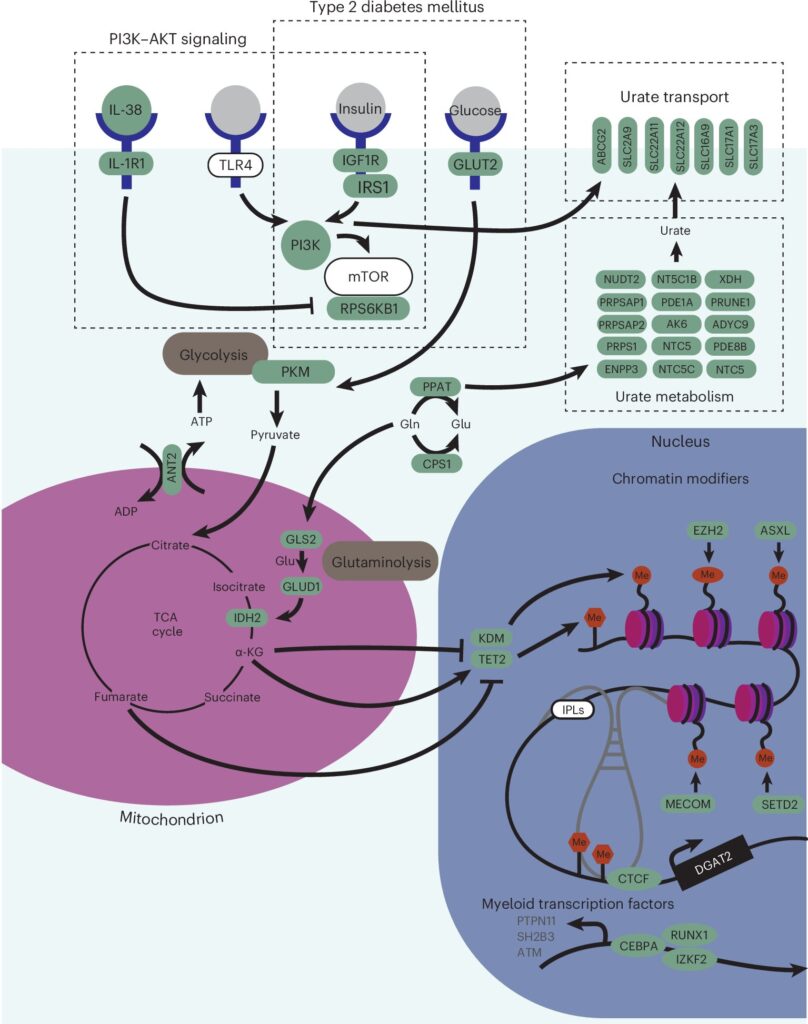Associations between insulin signaling, tricarboxylic acid cycle, epigenomic reprogramming cellular pathways and gout-related gene candidates. Credit: Nature Genetics (2024). DOI: 10.1038/s41588-024-01921-5
A major international study has found that gout is a chronic disease and genetics, rather than the patient’s lifestyle choices, are the main cause.
The genome-wide association study, led by researchers at the University of Otago and published in Nature Genetics, analyzed the genetic information of 2.6 million people.
Researchers analyzed DNA datasets from around the world. About three-quarters of the data came from customers of 23andMe, Inc., a direct-to-consumer genetics and preventive healthcare company, who agreed to participate in the study.
Researchers have found that genetics are an important part of why some people get gout, but most people don’t.
Lead author Professor Tony Merriman, from the University of Otago’s Department of Microbiology and Immunology, hopes the findings will help dispel some of the stigma surrounding gout.
“Gout is a chronic disease with a genetic basis and is not the patient’s fault. We need to break the myth that gout is caused by lifestyle and diet.
“This widespread myth creates shame for gout sufferers, and some may suffer in silence and not go to the doctor to receive preventative medication to lower uric acid levels in the blood and prevent pain. It will be expensive.
“People believe that certain dietary factors, such as eating red meat, can trigger gout attacks, but the root cause is high uric acid levels, crystals in the joints, and the ability to ‘attack’ the crystals. You need to understand that it is a primed immune system. It plays an important role in all these processes. ”
This research has identified numerous immune genes and pathways that provide new targets and approaches to prevent gout attacks.
Professor Merriman hopes these findings will lead to improved treatments for gout patients.
“We hope that in time, better and more accessible treatments will be available using the new targets we have identified,” he says.
One such option could be the repurposing of drugs used to treat a variety of other immune-related diseases, including rheumatoid arthritis. Tocilizumab targets the receptor for the immune signal transducer interleukin-6, which the study identified as a new gene for gout.
Information about gout:
Gout is the most common form of arthritis in men. It affects approximately 3 to 4 times more men than women. Gout attacks are caused by severe inflammation of the joints caused by a reaction to urate crystals. These crystals form in the joints when uric acid levels are high in the body. Although diet plays a very small role in high uric acid levels, it is well known that diet can trigger gout in people who have urate crystals in their joints. Gout can be effectively treated with drugs (such as allopurinol) that lower urate in the blood and prevent urate crystals from forming in the joints (or dissolving them if they are already present). Gout is a chronic disease, so treatment is required for a lifetime.
Further information: Tanya J. Major et al, “A genome-wide association approach” reveals new pathogenic pathway for gout*, Nature Genetics (2024). DOI: 10.1038/s41588-024-01921-5
Provided by University of Otago
Citation: Study finds genetics, not lifestyle, is the main cause of gout (October 15, 2024) https://medicalxpress.com/news/2024-10-genetics-lifestyle-major-gout Retrieved October 15, 2024 from .html
This document is subject to copyright. No part may be reproduced without written permission, except in fair dealing for personal study or research purposes. Content is provided for informational purposes only.

